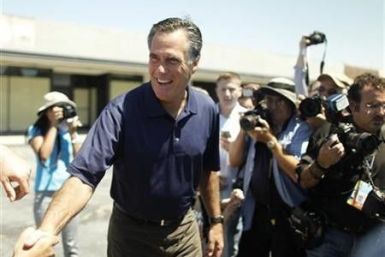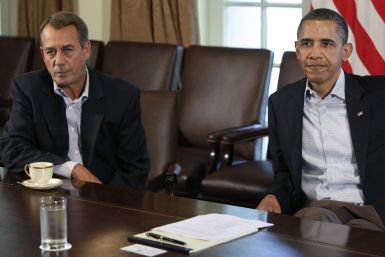Is there one statistic that can provide a quick-read on the U.S. economy's health and outlook? Indeed there is: it's the price of oil.
Two former top officials at the Federal Reserve conditionally endorsed a further round of bond buying by the U.S. central bank to spur a flagging economic recovery, the Wall Street Journal said on Wednesday.
The financial problems in Rome in the early part of the third century AD stemmed from a military that was getting too large and expensive (one of the pitfalls of carving a huge empire that became too unwieldy.
Would distributing $3,000 gift cards to every American over age 16 get the U.S. economy out of its slump, and create more jobs? The tactic is unconventional, but if the economy doesn't start creating more jobs soon, Congressional leaders may have to implement the unconventional.
A Beijing-based ratings agency on Wednesday downgraded the U.S. sovereign debt rating, while Western agencies such as Fitch and Moody?s reaffirmed their AAA rating, following Congressional approval of a plan to raise the debt ceiling.
With more than 14 million people out of work, consumer spending falling by the day, the GDP growth outlook remaining grim and rising inflation denting confidence of ordinary people, a massive spending cut of more than $2 trillion would be the proverbial last straw on the camel's back.
The Swiss National Bank cut its interest rate target band on Wednesday in a surprise move to stem the rapid rise of the Swiss franc, which investors have flocked to seeking harbor from the European and U.S. debt crises.
Pressure will build among Federal Reserve policymakers at a meeting next week for measures to pep up a stumbling recovery with a stronger commitment to rock-bottom interest rates.
Borrowing by small businesses jumped in June to the highest level in more than three years, a sign that a so-far elusive resurgence in economic growth may be around the corner.
Underlying trends suggest that the current bout of high inflation in the United States is likely to be short-lived, San Francisco Federal Reserve Bank researchers said on Monday.
The increase in the debt ceiling is only half of what President Obama was asking for and will therefore create another round of default trauma when the next debt ceiling is reached. I
The tentative deal to avoid a crushing debt default is at best a mild relief for the U.S. economy that nearly stalled in the first half of the year and has yet to show signs of any realistic pickup.
After two weeks of acrimony, Democrats and Republicans, perhaps after having stared into the abyss, returned to the bargaining table Saturday. Still, no one will believe the issue has been resolved until President Barack Obama signs a bill that raises the debt ceiling and cuts the budget deficit.
As unlikely as such a scenario might seem, it has actually happened in the past.
Anemic U.S. growth is not enough to prompt Federal Reserve Chairman Ben Bernanke to call for a new round of monetary stimulus.
Lawmakers were still unable to reach an agreement on the U.S. debt ceiling on Friday, but there is no arguing that the dollar's safe-haven appeal should remain trumped by the Swiss franc and Japanese yen.
With four days remaining until the United States hits its debt limit, President Barack Obama on Friday told deeply divided Republicans and Democrats to stop bickering and find a way "out of this mess."
U.S. gross domestic product (GDP) rose just 1.3 percent in the second quarter and a scant, revised 0.4 percent in the first quarter -- statistics that reveal a U.S. economy that's not only growing at a very slow rate, it's in danger of falling back into a recession.
Republican presidential front-runner Mitt Romney has been on a glide path toward the 2012 primary elections, serving up a steady diet of soundbites and campaign material attacking President Barack Obama on jobs and the economy.
If the impasse over the U.S. debt limit isn't broken soon, President Barack Obama will be forced to decide how he will manage the crisis.
It is understandable that foreign investors have been losing confidence with the U.S.?s ability to deal with its debt issue
There was little good news on the debt deal front early Wednesday: Democrats and Republicans are working on separately debt reduction plans, neither of which is likely to pass both chambers. A debt deal at this late stage is looking increasingly less likely.



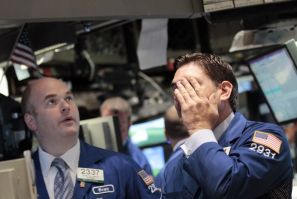










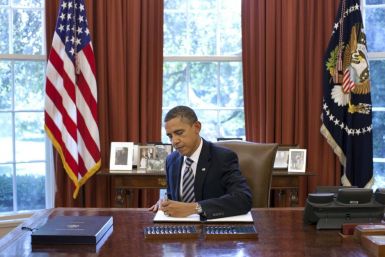
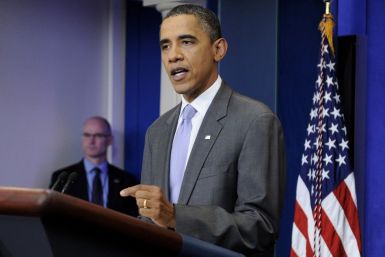

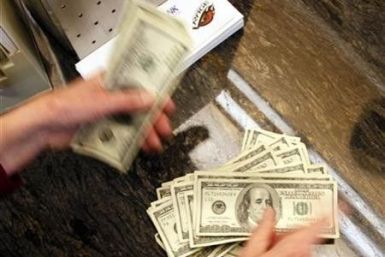
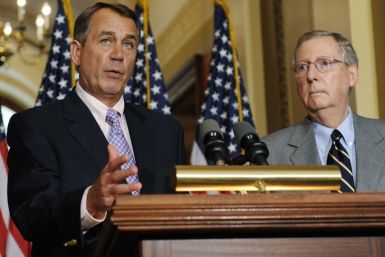
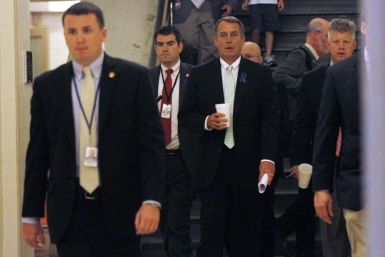



![Norway Oslo Twin Attacks Kill 92, King and Primer visit survives [PHOTOS]](https://d.ibtimes.com/en/full/800301/norway-oslo-twin-attacks-kill-92-king-primer-visit-survives-photos.jpg?w=385&h=257&f=c210d6d8f1171bb867da173831eeec87)

